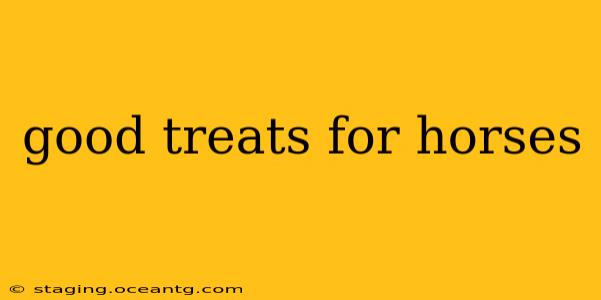Horses, like all animals, enjoy the occasional treat. Offering a tasty reward can be a great way to bond with your horse, reinforce training, or simply show your appreciation. However, not all treats are created equal. Choosing the right ones is crucial for your horse's health and well-being. This guide explores the best treats for horses, considering factors like nutritional value, safety, and palatability.
What Makes a Good Horse Treat?
A good horse treat should be:
- Nutritious: While treats shouldn't replace a balanced diet, they can supplement essential nutrients. Look for options low in sugar and high in fiber.
- Safe: Avoid treats containing harmful ingredients like chocolate, caffeine, or xylitol (commonly found in sugar-free products). These can be toxic to horses.
- Easy to Digest: Choose treats that are easy on your horse's digestive system, avoiding those that are overly rich or sugary.
- Appropriate Size: Offer small portions to prevent digestive upset and avoid overfeeding. A treat should be a supplement, not a meal replacement.
- Palatable: Select treats your horse actually enjoys! Experiment with different options to find their favorites.
Best Types of Horse Treats
Many options provide healthy and delicious rewards for your equine companion. Some of the most popular include:
- Carrots: A classic and readily available option, carrots are rich in beta-carotene and fiber. However, feed them in moderation as they can be high in sugar.
- Apples: Another favorite, apples offer vitamins and fiber. Remember to remove the core and seeds before feeding to avoid choking hazards.
- Bananas: These provide potassium and other essential minerals. Like apples and carrots, they're best given in moderation due to their sugar content.
- Low-Sugar Granola: Check the ingredients carefully to ensure it's low in sugar and doesn't contain harmful additives. Look for options that are high in oats and other wholesome grains.
- Commercial Treats: Many reputable brands offer horse treats formulated with nutritional value in mind. Look for treats that are low in sugar and high in fiber. Read the ingredients carefully before purchasing.
- Hay Cubes or Pellets: These offer a higher fiber option compared to sugary treats and can be a great reward, especially for horses needing extra roughage.
What Treats Should I Avoid Giving My Horse?
Several common items are toxic or harmful to horses and should be strictly avoided:
- Chocolate: Contains theobromine, which is toxic to horses.
- Caffeine: Can cause heart problems and other issues.
- Xylitol: A sugar substitute that is extremely dangerous for horses.
- Avocado: Contains persin, which can cause vomiting and diarrhea.
- Alcohol: Extremely toxic and should never be given to horses.
- Onions and Garlic: Can damage red blood cells.
- Large amounts of sweet feed or grain: This is not a treat but a meal, feeding excess can lead to serious health problems.
How Often Should I Give My Horse Treats?
Treats should be a small part of your horse's overall diet. Overfeeding treats can lead to obesity, metabolic disorders, and other health problems. A good rule of thumb is to limit treats to a few small pieces per day.
Can I Make My Own Horse Treats?
Yes! Making homemade horse treats allows you to control the ingredients and ensure they are healthy and safe for your horse. Recipes abound online for treats using ingredients like carrots, apples, oats, and other wholesome grains.
What if My Horse Doesn't Seem to Like the Treats I'm Offering?
Every horse has its preferences. If your horse isn't interested in a particular treat, try offering something else. Experiment with different fruits, vegetables, and commercially available options to find what your horse enjoys the most.
Remember, responsible treat-giving is key to maintaining your horse's health and strengthening your bond. Always consult with your veterinarian or equine nutritionist if you have any concerns about your horse's diet or the suitability of particular treats.
